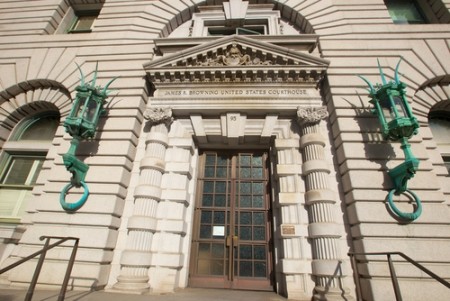9th Circuit nominee is withdrawn after controversy over his college writings

The San Francisco-based 9th U.S. Circuit Court of Appeals/CSNafzger (Shutterstock.com.)
Senate Majority Leader Mitch McConnell announced on Thursday that he will withdraw the nomination of Ryan Bounds to the San Francisco-based 9th U.S. Circuit Court of Appeals.
The decision by McConnell, R-Ky., came amid concerns about Bounds’ opinion articles that criticized “race-think” and sensitivity training written for a college newspaper when he attended Stanford University. The Oregonian, the National Law Journal, the Washington Post and the Hill have coverage.
Sen. John Cornyn, R-Texas, told reporters that the decision to withdraw the nomination was made with the White House after Sen. Tim Scott, R-S.C., raised concerns. “I think it became apparent the nominee was not going to prevail,” Cornyn said. Scott is the the first African-American since Reconstruction to represent a Southern state in the Senate, according to the Senate website.
Scott said he had reviewed Bounds’ materials and, “The information I had was insufficient for me to be a ‘yes’ vote.”
Bounds had received a unanimous qualified rating from the ABA Standing Committee on the Federal Judiciary. Each committee member votes for a rating of either “well qualified,” “qualified” or “not qualified.”
Bounds, an assistant U.S. attorney in Oregon, did not have the support of either of the state’s senators. Democrats Ron Wyden and Jeff Merkley read passages from Bounds’ articles on the Senate floor Tuesday night, while Merkley displayed poster boards with some of the most controversial writings, the Oregonian had reported.
One of Bounds’ articles criticized “race-think” in which groups of “multicultural demagogues” create racial divisions at Stanford.
“During my years in our Multicultural Garden of Eden,” he wrote, “I have often marveled at the odd strategies that some of the more strident racial factions of the student body employ in their attempts to ‘heighten consciousness,’ ‘build tolerance,’ ‘promote diversity’ and otherwise convince us to partake of that fruit which promises to open our eyes to a PC version of the knowledge of good and evil. I am mystified because these tactics seem always to contribute more to restricting consciousness, aggravating intolerance and pigeonholing cultural identities than many a Nazi bookburning.”
Another article criticized mandatory sensitivity training after vandalism of a gay pride statue.
During his hearing before the Senate Judiciary Committee, Bounds said he shared the concern of others that his rhetoric in the early 1990s was “overheated” and “overbroad.” His writings, however, explored “how best to assure a diverse and mutually tolerant campus,” he said.
Write a letter to the editor, share a story tip or update, or report an error.


